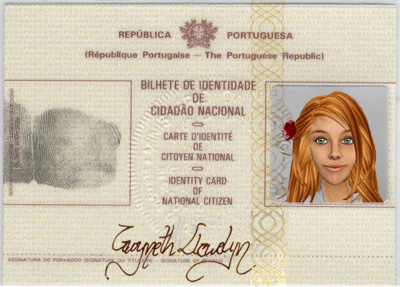The list of reasons for “dealing in the flesh” is as long as the White Pages. Typical comments are “I have to look in someone’s eyes to know if I trust them”, or variations related to reading body language. As I’ve alluded before, body language is just part of the issue of confirming a reputation, but the real checks come from the group that has emitted that reputation. In a sense, however, most of us labour under the false assumption that if a thousand people claim that a specific individual has a good reputation, you have superior mental powers able to determine the rotten core, but your mental powers don’t work across a telephone line (or an email message). Scope gives the following fine example, which is also common: if you decide on a supplier based on quality of their service, and you can get hundred references for their good work, and look at the portfolio online, why is “knowing the real name” so important? Why do so many people believe it’s harder to forge a copy of an ID card with Photoshop than to forge a list of hundred references from happy customers? As I once showed, forging an ID card, even for the non-expert Photoshopper, just takes a couple of hours:
Well, granted, that picture is from 2007 and definitely not one of my best, but I’m pretty sure that I could get it done much better these days 🙂 So, with a little more patience, I could use that ID card to open a bank account, register a small business name, rent a PO box, and make nice-looking documents of all the above, and prepare my mega-fraud. You might ask me why I never did that; believe me, the temptation has been great, and I do have a credit card emitted under the name “Gwyneth Llewelyn” 🙂 But is this the correct way of doing business? Hardly so. I prefer to rely on my reputation instead.
On the other hand, ranking #8 on Google if you search for “Gwyneth” (the first links are all from the lovely Gwyneth Paltrow) took me about 5-6 years of building up a digital reputation that made people all over the world to link to me, or quote me, or, well, publish things where my name is referred someplace else. That cannot be easily faked. And even — admittingly — that a computer wizard with a criminal mind would be able to reproduce all that in a few days (assuming it’s possible!), what would be the point? If it’s to sell L$100 HUD attachments, that’s hardly worth the time spent in setting up the whole thing. If it’s to do a US$100 million fraud, are you sure that the Interpol wouldn’t be after you?
Since we’re back to Second Life… yes, Second Life is also a huge marketplace, which bears more similarity to eBay than to anything else, if we just examine the economic aspects of it. Obviously eBay makes far more money than Linden Lab: the difference is that in SL only content is sold, and content is insanely cheap (compared to eBay’s average price). Nevertheless, SL has several orders of magnitude more items for sale. And Second Life residents are as pseudonymous as eBayers — they reveal as much information as they’re willing to reveal and not more than that. That allowed over half a billion US$ transactions last year alone. So somehow, in spite of the utter lack of “real life credentials” attached to avatars, people still buy and sell like crazy inside Second Life. We shouldn’t be surprised. They do that on eBay, too. Perhaps the difference is that SL has a vast amount of information on its own blogosphere that allows patient tracking of someone’s reputation.
So, honestly, we have to re-examine the motivations for the “need” and the “obsession” with so-called real-life identity. I continue to insist that there really are only three reasons. The first is purely irrational, and is a direct consequence of the Fallacy of Composition which makes us think that partial information (in this case, a copy of a “real” ID card or Government-emitted certificate) is enough to establish reputation-by-proxy. It is also closely tied to “common sense” (or, rather, common nonsense): we feel that if thousand people claim this person is honest, you might have a different opinion by standing in the same room and breathing the perfume she’s wearing.
It’s very, very hard to drop old misconceptions of the universe that surrounds us. Things won’t change in a day, even when people are faced with evidence proving otherwise. It’s what some guys call “gut feeling”: in business, you have to trust your “instincts”, not real, factual data, which can be “spinned” or “doctored” to look better than it is. Incidentally, a good reason for that attitude on the business side of the issue comes from the typical notion that a sales representative has to “lie” to sell a product — even if it’s just a “white lie” that enhances and overstates what a product or service does. Haggling is apparently part of our instinctive behaviour: the ability to “role-play” a negotiation, where both sides will present fantastic arguments, often little related to factual reality, but by “outstaring” your adversary on the negotiation, you’ll get a better deal that way. Online communications replace all that “emotional game” with facts, and salesperson don’t like that (you might remember how at some point in the early Internet days, many companies were very reluctant to display their prices publicly, “because a client might compare us with the competition much easier that way”, thus bypassing the salesperson entirely. Nowadays, most companies fear that if they don’t list their prices, their customers will think — often rightly so! — that they have something to hide, and go shop elsewhere, where all prices are shown).
On Second Life, the problem has only arisen recently with the rise of pirated content. Since on the Web this phenomenon is rare (you can usually grab most things you see in the Web for free), people were simply unprepared for it, and suddenly realised that they were relatively unprotected. It’s not that they were protected at all; they just laboured under the false assumption that they were. When this assumption was finally shown to be false, many desperately raised the cry for the end of anonymity (or pseudonymity). Since this would also minimise the issue about teens on the adult grid and similar problems, Linden Lab lent that very vocal minority their ears. But this is not the most important reason.
The second reason is a legacy of bureaucracy. As said, at least since WWII, business transactions relied almost exclusively on exchange of documentation, often witnessed by notaries, and certainly with lots of reputation-by-proxy documents coming from governments or institutions. It’s hard to dump all that into the waste bin after being so used to that system. Corporate rules might be impossible to overcome in some cases, even if individuals might be willing. This is a roadblock for some organisations, but I have seen the tide slowly changing. Email was the first breakthrough. Imagine that a defence contractor signs a paper-and-ink document establishing that they will outsource some work to a service provider, which has delivered tons of documents and certificates. After the contractual phase is finished, the first thing they receive is an email saying: “Hi, I’m John Doe, and although we never met, I’ll handle project management on our side”. From then on, contacts might be made via email with that person without a second thought — even if the contractor might never heard of John Doe before, has no clue how easily email can be forged, and has no way to know if this person is a legitimate employer. But of course they think that they can always sue the company if this John Doe is not legitimate…
The third reason, and this is what has happened with Facebook, and possibly with Second Life soon, might be far more interesting. Wallace Linden unveiled the issue a bit, when talking about “fighting for the right of becoming an online identity provider”. These days, it starts to become hard to find a website that doesn’t allow you to connect with your Facebook, Twitter, OpenID, Yahoo, Google, or Microsoft Live account. Linden Lab seems either to think that they could enter this market as well, or, conversely, accept digital IDs from those providers to register for SL. This would make some things very easy, e.g. imagine you’d register with your Facebook account, and would automatically get a list of all your Facebook friends that have also joined Second Life as well, and offer to connect with them. As described on an earlier article, I believe this might give SL a huge boost, specially during the first hours/days, where you haven’t explored anything yet and have no idea who your friends are. But to allow this — I haven’t read Facebook’s terms of service for interconnecting with their digital ID service — LL might require that somehow the Facebook-linked profiles only have RL data on them. I’m just wildly speculating here, of course, but I can imagine this to be the case.
But perhaps all that Linden Lab wants to do is to go the same route that Facebook went in 2007: display content-targeted ads. When Microsoft agreed to deploy their own ad engine on Facebook (following Microsoft’s acquisition of a chunk of the shares), they specified that their advertisers would only be able to do some serious work with profiles with “real” names and addresses, not silly nicknames, so Facebook changed their terms of service accordingly, and started to kick out profiles registered under a nickname. (Of course, stories like this one show that Facebook’s way of dealing with private information is less than stellar.)
Maybe — just maybe! — Linden Lab started considering to use the same technology to display in-world ads, or ads during teleportation/login. That would mean providing as much real data on the avatar as possible.
Profiling data on the Internet is definitely one of the best business areas to be at this time. It’s a marketeers’ paradise: where once they only had data warehouses processing truly anonymous usage (say, supermarket data), now they can not only get direct real data from Facebook, but, thanks to the publicly displayed friends list, gather information on your friends and family too…
Sadly, this is one typical case where the whole world has been placed upside down. Instead of demanding more access to real data to establish some reputation and link it to an identity, for the purposes of enhancing business transactions — still a fallacy, but nevertheless one that we’d be familiar with — what Facebook is doing is allowing targeted spamming via their service: a dubious borderline practice which is close to the boundaries of what is legally permissible. Spamming might be illegal on most countries, but targeted advertising, which requires exchanging real data among several unknown companies, is not. Ironically, the issue is not even “privacy” vs. “establishment of reputation” any longer: it’s just a question of who sells more ads…




